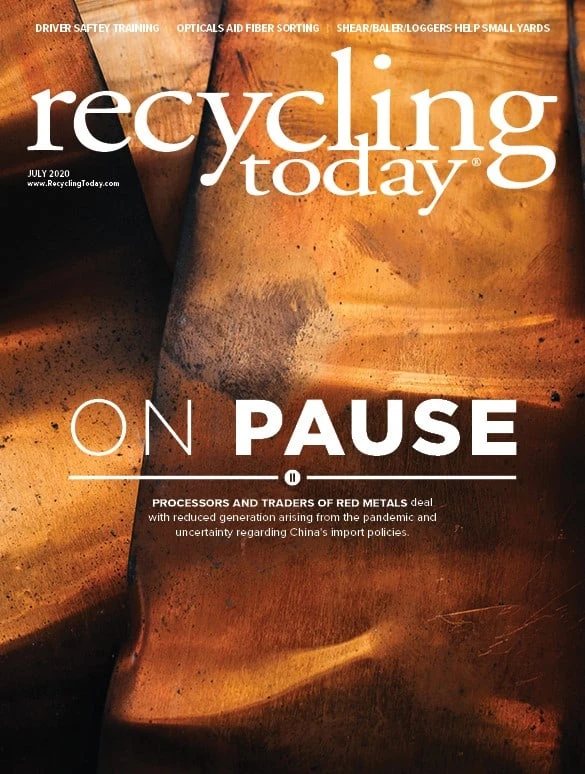
The International Secure Information Governance & Management Association (i-SIGMA), headquartered in Phoenix, sent a survey to its members in April and again in May to help ascertain the impact the COVID-19 outbreak has been having on businesses in the secure destruction and records and information management industries.
The surveys, only open for 48 hours, still managed to get 20 percent response rates from i-SIGMA’s 1,200 members. Respondents’ service areas range from large metro areas to rural areas and they provide a variety of services, such as on-site paper shredding, records storage and information technology asset disposition.
Survey results, available at https://isigmaonline.org/resources-for-navigating-the-covid-19-pandemic, show 26.8 percent of respondents in April experienced a decrease in revenue that ranged from 21 percent to 40 percent. This result ties into the fact that 22.6 percent of respondents state that roughly 21 percent to 40 percent of their clients informed them they were closed or would not be using the companies’ services for the time being. Although revenues decreased for some firms, 58.9 percent of respondents in April say they maintained full employment during the pandemic.
Impact on services
Impacts of the pandemic varied heavily depending on location. “The members that were in the tri-state area of New York City, northern New Jersey and eastern Pennsylvania saw a much more significant decrease in demand simply because the restrictions were so much more onerous and the impact of the virus was so much more onerous that many of them literally came to a halt in those marketplaces,” Bob Johnson, CEO of i-SIGMA, says. “Whereas, we had other marketplaces that were less impacted in the middle of the country, in some very large cities by the way, where our members were still reporting they were at 90 percent capacity.”
In addition, the severity of the pandemic’s impact on service providers’ customers’ volumes depended a great deal on whether those customers were deemed essential businesses.
“Customers who fell into the essential services realm—hospitals, medical facilities, doctors, but even infrastructure of city governments where services are absolutely needed, those types of things—there’s been very little impact,” Johnson says. Customers in these categories even increased demands for service, he adds.
On the flip side, Johnson says customers deemed less essential or nonessential decreased or halted their service demands. “Certainly, some of [these customers] went completely dark,” Johnson says, while volume decreased considerably at other such clients.
However, as states have begun to reopen, the i-SIGMA May survey indicates that respondents’ volumes have picked up, with many expressing a high degree of optimism for the future of the industry.
Nearly 59 percent of i-SIGMA’s April survey respondents indicate they have applied for government relief offered through the Paycheck Protection Program (PPP). Indeed, government programs, such as PPP, were some of the first resources businesses gravitated to amid the economic crisis created by the pandemic.
“Any initial response was to apply for the available government support, to communicate to customers quickly to find out what customers are still in business [and] to modify service scenarios,” Johnson says.
About 45 percent of respondents in April report they have engaged in regular communications to advise their employees and their clients’ employees on their COVID-19 responses related to health and safety.
Regarding how COVID-19 has changed how secure destruction firms are servicing accounts, Johnson says more customers are bringing material to trucks or front doors rather than having service personnel enter their buildings. He says firms are more conscious of when and how customers and employees interact.
From an operational perspective, he adds that secure destruction companies are paying more attention to the bins that are being exchanged. “[They] are being disinfected prior to being placed in the customer’s location; the service providers themselves are wearing masks and they’re washing their hands,” Johnson says.
Future outlook
In terms of the immediate future, 69.3 percent of respondents in April say they believe the situation will improve over the next three months.
Two COVID-19-related concerns that could affect the secure destruction industry include remote working and increased digitization, which leads to less paper generation. However, both these trends already were taking place prior to the pandemic and had little to no additional impact on service revenue during the pandemic, according to respondents.
“The attention customers were putting on how [they] are getting rid of [their] information was increasing so much that it overcame any single-digit decrease in the amount of paper that was being consumed,” Johnson says.
Regarding remote working, he says, the pandemic has accelerated that trend, “but when the dust clears from this thing, people will be back at their offices working to some degree or another, and that is where the information will be generated that needs to be destroyed.”
Additionally, 58.9 percent of respondents in April say they are “very confident” in their firms’ chance of surviving the impact of the pandemic. That number grew to more than 69 percent in the May survey.
Although most firms’ service revenues are down 20 percent to 40 percent, Johnson says these businesses likely will survive as things return to normal. “We have already been very resilient, and there hasn’t been this horrific impact in the beginning, so that obviously sends great signals that as the economy rebounds, we’ll get very close to, if not reach, the same heights that we were at prior to that.”
While long-term trends such as digitization, telecommuting and cloud computing are challenges, Johnson says i-SIGMA members will respond to these challenges and opportunities and “morph into businesses that meet the needs of their customers in that space anyway.”
Get curated news on YOUR industry.
Enter your email to receive our newsletters.
Explore the July 2020 Issue
Check out more from this issue and find your next story to read.
Latest from Recycling Today
- Republic Services, Blue Polymers open Indianapolis recycling complex
- Altilium produces EV battery cells using recycled materials
- Brightmark enters subsidiaries of Indiana recycling facility into Chapter 11
- Freepoint Eco-Systems receives $50M loan for plastics recycling facility
- PET thermoform recycling the focus of new NAPCOR white paper
- Steel Dynamics cites favorable conditions in Q1
- Hydro starts up construction in Spain
- Green Cubes unveils forklift battery line






